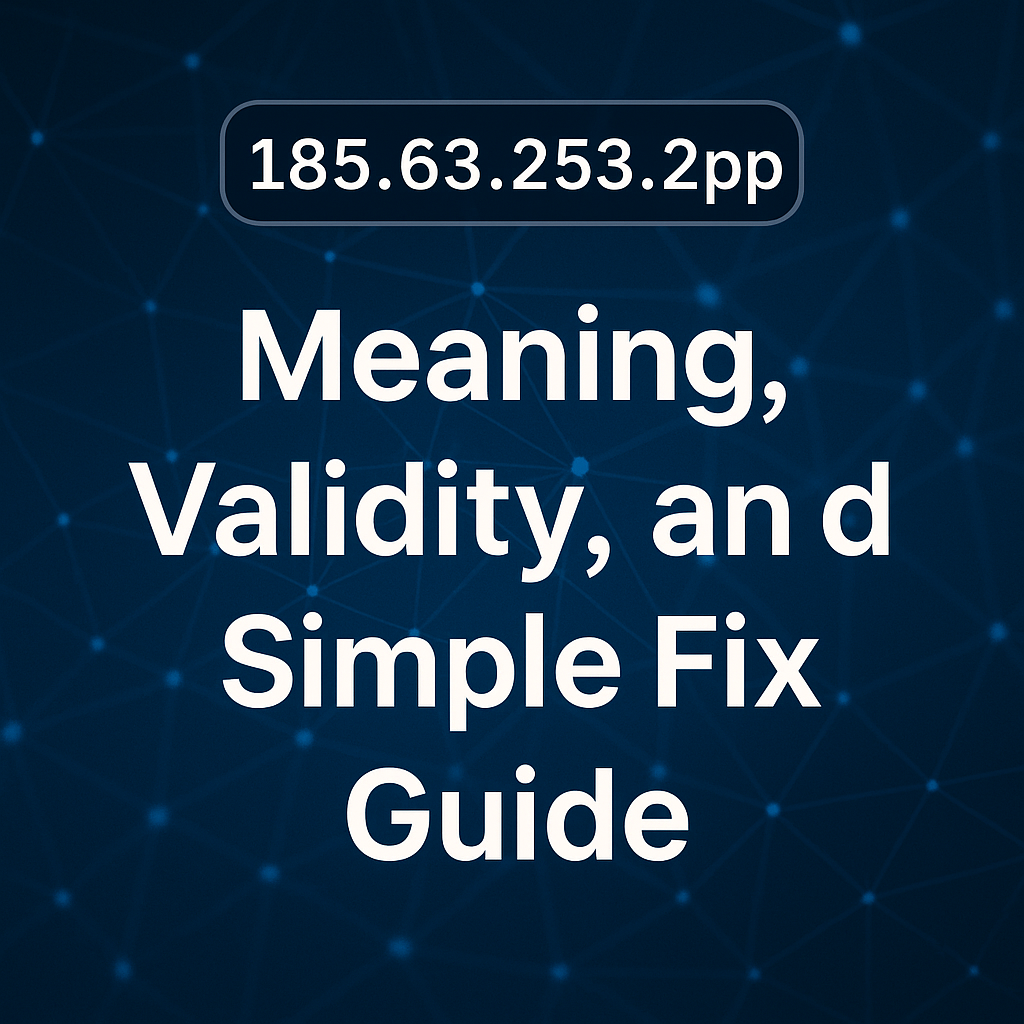What Is 185.63.253.2pp : A Simple Guide
Sometimes you may see a strange address like 185.63.253.2pp in your website logs, analytics reports, or network tools. At first, it looks like a normal IP address, but it is not a real or valid one. The extra letters “pp” make it different from standard IPv4 addresses that contain only numbers TransDS
This guide explains what 185.63.253.2pp means, why it is not a valid IP address, how it can appear in your system, and what you can do when it shows up. By the end, you’ll understand how to identify, check, and safely handle this kind of entry in your network or analytics data.
What Is an IP Address?
An IP address is a number used to find devices on the internet. Every computer, phone, or server connected to the internet has one.
A normal IPv4 address has:
-
Four numbers separated by dots
-
Each number between 0 and 255
-
No letters or extra symbols
Example: 192.168.1.10
If you add letters or symbols, it becomes invalid. So “185.63.253.2pp” is not valid because of the letters “pp”.
Breaking Down “185.63.253.2pp”
Here’s how it looks:
| Part | Meaning | |
|---|---|---|
| 185.63.253.2 | Real IPv4 address from a hosting company in the Netherlands | |
| pp | Extra letters added to the end |
The correct part (185.63.253.2) belongs to a data-center called HostPalace Datacenters Ltd. The wrong part (pp) breaks the format.
Why It Is Invalid
Computers only understand IPs made of numbers. When they see extra letters, they cannot read or connect to it. If you try to use ping 185.63.253.2pp,it will fail, that means “185.63.253.2pp” cannot be used for network traffic.
Where You Might See It
You can find this string in many tools or systems.
| Place | Why It Appears |
|---|---|
| Web server logs | Mistyped or fake visitor address |
| Analytics dashboards | Spam or broken data |
| Firewall logs | Bad packets or parsing errors |
| Developer tools | Example text or testing data |
| Email headers | Spoofed or fake source |
These are common but not dangerous by themselves.
Still, you should check why they appear.
Why the “pp” Might Exist
There are a few simple reasons why someone or something adds “pp” at the end.
Common Causes
-
A typing mistake made by a user or developer
-
A placeholder added to show the IP is not real
-
A software bug that joined two fields together
-
A bot or spam system trying to trick filters
-
A custom tag made by a script for testing
Most of the time, it is not harmful. But repeated cases could mean your data is being manipulated.
Checking the Base IP
You can look up 185.63.253.2 in an IP lookup tool. It shows that it is owned by a hosting company in the Netherlands.This means it is part of a shared server system used by many . That is normal. However, data-center IPs are sometimes used by bots or proxies. So it is good to check if it appears often or acts suspiciously.
What to Do When You See It
If “185.63.253.2pp” shows up in your logs, follow these steps.
Simple Actions
-
Check your logs – See where and how often it appears.
-
Remove extra letters – Use only “185.63.253.2” for lookup.
-
Look up the IP – Use trusted tools like ipinfo.io or abuseipdb.com.
-
Watch for patterns – If it repeats daily, note the time and source.
-
Fix your code – Add validation to stop non-numeric IPs.
-
Filter analytics – Exclude such data from reports.
-
Document it – Write down what you found for your records.
Risk Level
Here is how to think about the risk:
| Situation | What It Means | Risk |
|---|---|---|
| Appears once | Likely a typo or harmless log entry | Low |
| Appears many times | Could be a bot or scan activity | Medium |
| Appears with failed logins or attacks | Possible malicious activity | High |
You do not need to panic, but it is good to stay alert.
How to Keep Your Data Clean
You can stop such bad entries from showing up by using simple checks.
| Task | How to Do It |
|---|---|
| Validate IPs | Allow only digits and dots in logs |
| Sanitize inputs | Remove extra characters like letters |
| Filter analytics | Block IPs that don’t follow correct format |
| Monitor behavior | Watch for repeating malformed IPs |
| Update scripts | Make sure tools do not add extra text |
Good data hygiene helps you keep your reports and security tools accurate.
How It Affects Analytics
In analytics tools, malformed IPs like “185.63.253.2pp” can cause:
-
Wrong visitor counts
-
Spam referrals
-
Fake location data
You can fix this by filtering out IPs that contain letters. That keeps your traffic reports clean and real.
How It Affects Security Tools
Some bots send invalid IPs to confuse firewalls. A weak system might ignore or misread them. Strong systems log them as bad packets or fake addresses. If you see many “pp” or similar suffixes, update your detection rules. This helps your firewall catch strange traffic faster.
Why You Should Log It
Keeping notes on odd entries helps your future checks. Write down when it appeared, where it came from, and what you did. If it appears again, you’ll know whether it’s new or repeating.
Simple Example
Try a quick test:
-
Search “185.63.253.2” on an IP lookup site.
→ You’ll see details like country, provider, and owner. -
Search “185.63.253.2pp”.
→ You’ll get “invalid address” or “not found”.
That shows how one small change (“pp”) makes it useless for network tools.
Easy Checklist
Here’s a quick table you can use.
| Step | Action |
|---|---|
| 1 | Identify where the string appeared |
| 2 | Remove extra letters (“pp”) |
| 3 | Look up the real IP |
| 4 | Note if it repeats |
| 5 | Clean your logs and analytics |
| 6 | Add validation to avoid it next time |
Following these steps will keep your data safe and simple.
FAQs
What is 185.63.253.2pp?
185.63.253.2pp looks like an IP address but it is not a valid one. The extra “pp” letters make it different from real IPv4 addresses that contain only numbers and dots.
Is 185.63.253.2pp a real IP address?
No, 185.63.253.2pp is not a real or valid IP address. The valid form is 185.63.253.2, which belongs to a hosting provider in the Netherlands.
Why does 185.63.253.2pp appear in my server logs?
It can appear because of a typing mistake, a software bug, a bot using fake data, or a broken tracking system. It usually means that something in your log or analytics tool is reading data incorrectly.
Is 185.63.253.2pp dangerous or harmful?
On its own, 185.63.253.2pp is not dangerous. But repeated appearances could mean automated traffic or spam activity. It’s best to check and monitor it to stay safe.
How can I fix or remove 185.63.253.2pp from my data?
You can clean your data by:
-
Removing the “pp” suffix before analysis
-
Using validation rules to allow only digits and dots
-
Filtering malformed IPs from analytics or logs
Conclusion
The term 185.63.253.2pp looks like a normal IP address, but it is not a valid one. The extra “pp” letters make it different from real IPv4 formats that only use numbers and dots. This invalid form often appears in server logs, analytics tools, or firewall reports. Most of the time, 185.63.253.2pp is harmless and comes from typing mistakes, broken scripts, or fake bot traffic. Still, it’s smart to check your system whenever you see it. Look up the base IP (185.63.253.2), clean your logs, and filter out bad data in analytics.

